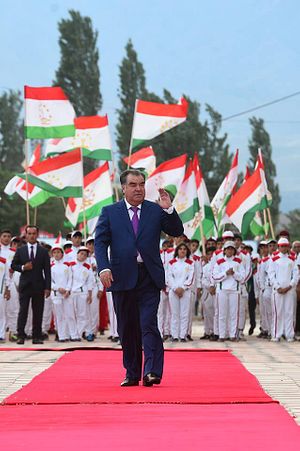On October 12, Tajikistan and the European Union held their ninth Human Rights Dialogue. The meeting in Dushanbe, according to the press release, was held in an “open and honest manner.”
The EU shied away from making harsh statements in its press release about the discussions. Noting that civil society space has become “more restricted” but there had been progress on women’s rights and statelessness, and acknowledging that “significant efforts” had been made to address torture issues. Media freedoms were mentioned, and the EU “raised questions concerning the freedom of religion and belief.”
The EU made mention of “imprisoned defense lawyer” Buzurgmehr Yorov, and said “[t]he European Union expects the Tajik authorities to ensure that no pressure is exerted on family members of the political opposition, including those living abroad.”
News flash: Dushanbe doesn’t care what the EU “expects.”
Every Tajikistan-EU human rights dialogue has been held in some variation of an “open and honest manner.” The first, in 2008, was held in an “open and constructive atmosphere”; the fifth, in 2013, has “a friendly atmosphere”; and the eighth, in 2016, was “open and frank.”
But open, friendly, and frank EU yearly chats have done very little to stem the disintegration of what little political plurality existed in Tajikistan.
Throughout 2015 and 2016 Tajikistan pursued, with fervor, the decimation of the country’s only significant opposition political force, the Islamic Renaissance Party (IRPT). Tajik authorities have made a habit of pressuring the relatives of the political opposition, in particular. In May 2016, for example, the 95-year-old father of Muhiddin Kabiri, the leader of the IRPT, was detained after his son spoke via Skype at a Washington DC event about human rights in Tajikistan.
Unmentioned in the EU statement was the fact that Yorov was the defense attorney for several of the IRPT leaders jailed last year. His own imprisonment came shortly that of his clients and human rights advocates say that is no coincidence. Yorov’s brother, also a lawyer, was arrested too.
On Twitter, Human Rights Watch researcher Steve Swerdlow took the EU’s statement to task, calling it “very weak” and going on to tweet, “#Tajikistan is experiencing its worst #humanrights crackdown in 20yrs and one would have no idea of that reading this statement.”
Indeed, as Swerdlow pointed out, the statement lauds Tajikistan for renewing the OSCE’s mandate but doesn’t bother to mention that Tajikistan boycotted the OSCE’s Human Dimension Implementation Meeting in September. Last year, at the meeting, during a session discussing Tajikistan, about 20 Tajiks staged a protest: they stood silently across the back of the room wearing shirts with pictures of imprisoned politicians and lawyers. The next day, there were reports that about 50 relatives of the protesters had been arrested in Tajikistan.
Contrasting this year’s statement with last year’s, the relative weakness of the 2017 statement shines through. In 2016, the EU at least mentioned having “serious concerns regarding a number of developments over the past year, including the prosecution and imprisonment of political opponents, members of their families, and lawyers representing them, and urged Tajikistan to fully investigate reports of torture and violations of the right to a fair trial in these cases.”
No “serious concerns” in 2017 and no mention of fair trials, why bother?
Ahead of the dialogue, Human Rights Watch urged the EU to “use this week’s dialogue to make clear there can be no business as usual. Brussels should set clear and public benchmarks for progress, and warn that Dushanbe’s failure to reform will have serious negative implications for the EU-Tajikistan relationship. Anything short of that would be meaningless.”
Clearly, the EU has failed to motivate Tajikistan’s leadership to reevaluate how it views human rights and political opposition. A harsher statement may have done nothing to inspire Dushanbe toward change but at least then Europe could say it was actually trying.
Meanwhile, days before the dialogue Greek authorities detained a member of the IRPT’s political council, Shohnaimi Karim (also known as Mirzorahim Kuzov), while he was en route to an OSCE conference. Just another member of the Tajik opposition ensnared by Dushanbe’s tendrils in Europe.































